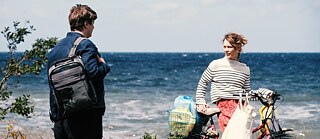Summer doesn't just bring heat and long nights, but also a thirst for adventure and new experiences. This is also reflected recently in German films. Six recommendations from Bianca Rauch.
Heat, laziness and long nights. Holidays, romance and a thirst for adventure. Summer. It's the time of year when the shadows of our everyday lives are flooded with sunshine. The months that offer new experiences every year. It is precisely this special atmosphere that film images can capture so well. In summer in particular, film characters often immerse themselves in new experiences. German feature films have also been telling more and more stories about this in recent years.The summer films presented here have one central motif in common: the search for light-heartedness. Escaping the daily grind either turns into unforeseen events or is within reach. The younger the characters, the more friendships and love affairs come into play. As they get older, work, family and coming to terms with the past come to the fore. In general, they all make one thing clear: letting go and embracing life is simply best in summer - bringing you closer to yourself and others.
Afire
Two budding artist friends take a break from Berlin and travel to the refreshing Baltic Sea. While Felix wants to work on his portfolio for art university in idyllic holiday mode, Leon is ambitiously working on his novel. Nadja is also staying at the holiday home of Felix's family. Together with lifeguard Devid, she messes up the duo's plans. Leon is highly sceptical and serious about everything and everyone. The summer hustle and bustle is finally spoilt when a threatening forest fire breaks out behind the garden and dunes.Alaska
Kerstin is also drawn towards the water in Alaska. Alone in a two-person kayak, she crosses the Mecklenburg Lake District, searching for herself and meeting others who are doing the same. With every paddle we learn more about these characters, who are fleeing the past but are confronted with their own history time and again. The water surfaces of Mecklenburg-Vorpommern are skilfully staged, reflecting more than just the landscapes. They are also a surface for reflection for the audience and offer a moment of liberation on both sides.No one's With The Calves
Twenty-something Christin lives with her boyfriend on his parents' farm. Rural dreariness in Mecklenburg-Western Pomerania. Every now and then she lends a hand looking after the cows and calves. In between, she passes the time by hanging around. One day she catches the eye of 46-year-old Klaus, and suddenly the yawning summer emptiness is replaced by a fiery passion.Someday We'll tell each other everything
In Someday we'll tell each other everything, 18-year-old Maria also experiences a secret, summer love affair with Henner, who is also considerably older. The story takes place in a village in Thuringia shortly after the reunification of Germany. Maria lives on the farm of Johannes' family, her boyfriend. For Maria though, the political upheavals and new opportunities become a minor matter as she longs only for her sweaty love affair.Queen OF Niendorf
Ten-year-old Lea, on the other hand, keeps a cool head when she decides to skip the holiday camp for the first time and spend the summer weeks entirely in her home village in Brandenburg. While her friends are closer to puberty and have new interests, Lea looks for adventures elsewhere. She fights for her place in a group of boys to explore the village and the surrounding area with them. In Queen of Niendorf, summer becomes that unique time of year when not only laziness and freedom spread, but also new adventures enrich (childhood) life.Cocoon
14-year-old Nora is also staying at home with her older sister Jule. For them, the hot weeks in Berlin before and during the school holidays are full of changes. Nora is not only surprised by her first menstrual period, but also by her first feelings of physical attraction and being in love. She develops a crush on the new girl at school, who is not only helpful, but also cool, brave and self-confident. In Leonie Krippendorff's feature film debut, diary-like smartphone footage and a wonderful soundtrack bring the big city summer to life in an authentic way - with the light-hearted feeling of endless outdoor pool afternoons.August 2024
